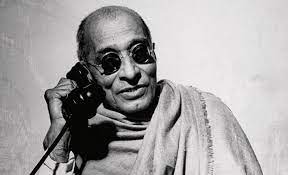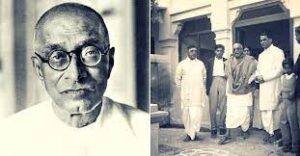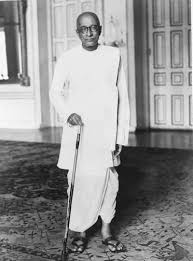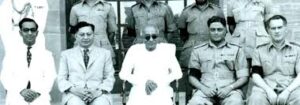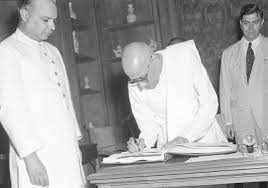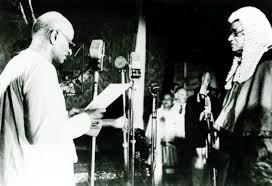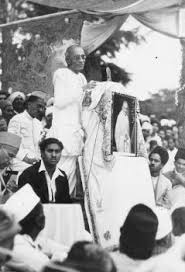Chakravarti Rajagopalachari (1878–1972), often referred to as Rajaji, was an Indian independence activist, statesman, and the last Governor-General of India. A prominent figure in the Indian National Congress, he played a crucial role in the freedom struggle alongside Mahatma Gandhi. Rajagopalachari served as the first Indian Governor-General from 1948 to 1950. A multifaceted personality, he was a prolific writer, contributing to literature with works like “Ramayana” and “Mahabharata” retellings. Known for his unwavering principles and statesmanship. Rajaji’s legacy extends beyond politics to encompass his literary and philosophical contributions to Indian society.
Chakravarti Rajagopalachari, commonly known as Rajaji, was an Indian statesman, independence activist, lawyer, writer, and the last Governor-General of India. Born on December 10, 1878, in Thorapalli, British India (now in Tamil Nadu, India), he died on December 25, 1972.
Rajagopalachari played a crucial role in the Indian independence movement. He was a well-known Indian National Congress leader and a personal friend of Mahatma Gandhi. He was Premier of the Madras Presidency (now Tamil Nadu) and Chief Minister of the former Madras State following independence.
In 1954, Rajagopalachari became the Governor-General of India, succeeding C. Rajagopalachari was a man of diverse talents. Besides his political career, he was an accomplished writer and thinker. He wrote various publications, including a shortened version of the Indian epic Ramayana, titled “Ramayana for Children.” His essays and commentary on a range of sociopolitical topics were likewise well-known.
Rajagopalachari’s contributions to the nation earned him respect and admiration. He received the Bharat Ratna, India’s highest civilian accolade, in 1954. He is regarded as a statesman who combined political acumen with intellectual prowess in India, where his legacy lives on.
Chakravarti Rajagopalachari Early Career:
Chakravarti Rajagopalachari, or Rajaji, was born on December 10, 1878, in Thorapalli, a tiny town in Tamil Nadu’s Salem district. He hailed from a distinguished Tamil Brahmin family with a legacy of education and public service. Rajagopalachari’s father, Chakravarti Venkataryan, was a noted scholar and pleader, and his mother, Singaramma, came from a family of activists involved in social and political causes.
Rajagopalachari’s early education took place in Hosur and later in Salem, where he showed exceptional academic prowess. His proficiency in multiple languages, including Tamil, Sanskrit, and English, became evident during his formative years. Rajagopalachari’s keen interest in literature and philosophy played a significant role in shaping his intellectual outlook.
In 1898, he moved to Bangalore to pursue higher education at the Central College, where he excelled academically. During this time, he had a strong interest in law and finally enrolled at Presidency College in Madras (now Chennai). Subsequently, he embarked on a legal career, becoming a successful lawyer in the Madras High Court.
Rajagopalachari’s early life laid the foundation for his later contributions to Indian politics, literature, and social reform. His intellectual curiosity, linguistic proficiency, and commitment to public service were evident from his youth. Marking the beginning of a remarkable journey that would see him play pivotal roles in the Indian independence movement and post-independence governance.
Chakravarti Rajagopalachari Education:
Chakravarti Rajagopalachari, often referred to as Rajaji, was an Indian politician, independence activist, and statesman. Born on December 10, 1878, in Thorapalli, Tamil Nadu, he played a significant role in the Indian independence movement and later served as the last Governor-General of India.
Rajagopalachari’s education was diverse and multifaceted. He began his schooling in Hosur and later attended Central College in Bangalore. He furthered his education at the Presidency College in Madras (now Chennai) and graduated with a degree in arts. Subsequently, he pursued law at the Law College in Salem.
His interest in literature and the arts was evident throughout his life. He was a voracious reader and had a deep appreciation for Indian classical music and culture. Rajagopalachari’s education, coupled with his intellectual curiosity, contributed to his well-rounded personality.
Rajagopalachari was well-known for his literary endeavors in addition to his political career. He wrote a great deal, both in Tamil and English, on a wide range of topics in fiction and non-fiction. He gained particular recognition for his Sanskrit to English translation of the ancient Indian epic, the Ramayana.
Rajagopalachari’s commitment to education and intellectual pursuits continued throughout his life. Making him not only a prominent political figure but also a respected intellectual in Indian history. His legacy endures as a symbol of the harmonious integration of education, literature, and political leadership.
Chakravarti Rajagopalachari Champaran Satyagraha:
Chakravarti Rajagopalachari, also known as Rajaji, played a significant role in India’s struggle for independence. He was not, however, intimately connected to the Champaran Satyagraha. The Champaran Satyagraha was a pivotal event led by Mahatma Gandhi in 1917 in the Champaran district of Bihar, India.
With the Champagne a term Gandhi attempted to address the problems of indigo farmers who were forced to cultivate indigo and subjected to severe circumstances imposed by British planters. The movement marked one of the early instances of Gandhi’s application of nonviolent resistance and civil disobedience against oppressive British policies.
Rajaji, on the other hand, was a prominent freedom fighter. A close associate of Mahatma Gandhi, and later became the last Governor-General of independent India. His contributions to the Indian independence movement were diverse, including his involvement in the Non-Cooperation Movement and the Civil Disobedience Movement.
Even though Rajaji was not a direct participant in the Champaran Satyagraha, the Indian liberation movement benefited much from his friendship with Gandhi and his tireless work in a number of movements.
Gandhi-Irwin Pact:
Mahatma Gandhi and Lord Irwin, a.k.a. Baron Irwin, the Viceroy of India at the time, signed the Gandhi-Irwin Pact, sometimes referred to as the Delhi Pact, on March 5, 1931. Chakravarti Rajagopalachari, often referred to as Rajaji, played a crucial role in facilitating the negotiations and mediating between Gandhi and the British government.
The pact marked a significant development in the Indian independence movement, particularly during the Civil Disobedience Movement led by Gandhi. The key points of the pact included:
1. Withdrawal of Civil Disobedience Movement:
A prominent figure in Indian politics, Chakravarti Rajagopalachari, popularly known as Rajaji, was a member of the Indian National Congress. One of his notable contributions was during the Civil Disobedience Movement led by Mahatma Gandhi.
A part of the larger struggle for India’s independence, the 1930 Civil Disobedience Movement saw Rajaji appointed President of the Congress. Following Mahatma Gandhi’s imprisonment following the Dandi March, they were tasked with leading the campaign.
However, as the movement progressed, Rajaji became increasingly concerned about the potential for violence and the impact it could have on the common people. He believed that the movement had achieved its purpose of highlighting the issues and grievances of the Indian people. And continuing it might lead to unnecessary hardships and violence.
Rajaji initiated negotiations for a peaceful resolution with the Viceroy of India at the time, Lord Irwin, in March 1931. The result of these negotiations was the Gandhi-Irwin Pact, signed on March 5, 1931. According to this pact, the Congress agreed to suspend the Civil Disobedience Movement, and in return, the government agreed to release political prisoners and allow the participation of Congress representatives in the Second Round Table Conference in London.
Rajaji’s role in the withdrawal of the Civil Disobedience Movement showcased his commitment to non-violence and his pragmatic approach to political negotiations. However, the pact did not fully satisfy all Congress leaders, and internal differences emerged within the party regarding the terms of the agreement. Despite this, the withdrawal marked a crucial phase in India’s struggle for independence and set the stage for future negotiations and developments in the political landscape.
2. Release of Political Prisoners:
Chakravarti Rajagopalachari, also known as Rajaji, was an Indian politician, independence activist, and the last Governor-General of India. He was a prominent leader in the Indian National Congress and played a crucial role in the Indian independence movement.
The release of political prisoners was a significant aspect of Rajagopalachari’s political ideology. He strongly believed in the principles of non-violence and civil disobedience, which were integral to the philosophy of Mahatma Gandhi. During various stages of the Indian independence fight, British colonial authorities imprisoned many political leaders and activists.
When India attained independence in 1947, there were still political prisoners held during the struggle. As the Governor-General, Rajagopalachari took measures to address this issue. He advocated for the release of political prisoners and worked towards national reconciliation. His strategy was based on the belief that the recently independent India ought to foster harmony and put the past behind it.
Rajagopalachari’s vision of a democratic and inclusive nation was congruent with his attempts to obtain the release of political prisoners. He hoped to create a more harmonious and cohesive India by pardoning and freeing individuals imprisoned for their roles in the freedom struggle. This approach reflected the broader ethos of the Indian independence movement. Which sought not only political freedom but also social justice and national unity.
It’s important to note that Rajagopalachari’s views on various issues, including the release of political prisoners, were shaped by the unique socio-political context of post-independence India. His legacy as a statesman and leader continues to be remembered for his contributions to the early years of independent India.
Independence and Post-Independence:
Chakravarti Rajagopalachari, popularly known as Rajaji, played a significant role in India’s struggle for independence and contributed actively to the post-independence era. Born in 1878, Rajaji was a prominent figure in the Indian National Congress and was associated with the freedom movement led by Mahatma Gandhi.
During the independence movement, Rajaji served as a trusted aide to Mahatma Gandhi and was actively involved in various civil disobedience movements, including the Non-Cooperation Movement and the Quit India Movement. His unwavering commitment to non-violence and his ability to articulate complex political issues earned him respect among his contemporaries.
Post-independence, Rajaji continued to contribute to the nation’s development. He served as the last Governor-General of India and the first Indian-born Governor-General from 1948 to 1950. Subsequently, he became the Chief Minister of the Madras State (now Tamil Nadu). Rajaji’s tenure as Chief Minister was marked by administrative reforms and efforts to address socio-economic issues.
Rajaji was a proponent of Gandhian philosophy and believed in simple living and high thinking. He was a prolific writer and thinker, contributing extensively to literature and political discourse. His ideas on governance, education, and social justice left a lasting impact on the nation.
In conclusion, Chakravarti Rajagopalachari was a multifaceted leader whose contributions spanned the crucial periods of India’s struggle for independence and the early years of nation-building. His legacy as a statesman, politician, and thinker remains an integral part of India’s historical tapestry.
Chakravarti Rajagopalachari Political Leadership:
Chakravarti Rajagopalachari, popularly known as Rajaji, was a well-known political figure in India who made numerous contributions to the nation. Born in 1878, he played a crucial role in the Indian independence movement and post-independence politics.
Rajagopalachari was a staunch supporter of Mahatma Gandhi and actively participated in various campaigns led by the Indian National Congress. His leadership qualities were evident in his ability to bridge the gap between different factions within the Congress, promoting unity during critical times. He was a key figure in negotiating with the British during the pre-independence period, contributing significantly to the shaping of India’s destiny.
After India gained independence in 1947, Rajagopalachari held several significant positions. He was India’s final Governor-General and, subsequently, the state of Madras’ (now Tamil Nadu’s) Chief Minister. His governance in Madras was marked by administrative reforms and a focus on education. As a leader, he advocated for social justice and economic development.
Rajagopalachari’s political ideology was marked by his commitment to principles of non-violence, decentralization, and individual freedom. His leadership style reflected a blend of pragmatism and idealism, and he often emphasized the importance of moral values in politics. Despite ideological differences with some Congress leaders, he continued to play a vital role in national politics.
Later in his career, Rajagopalachari founded the Swatantra Party, a political party that advocated for free-market principles and limited government intervention. This showcased his adaptability and commitment to his convictions.
In summary, Chakravarti Rajagopalachari’s political leadership was characterized by his unwavering commitment to the ideals of freedom, non-violence, and social justice. His ability to navigate the complex political landscape of pre- and post-independence India, along with his contributions to governance and policy, solidified his legacy as a respected leader in the history of Indian politics.
Autobiography:
Chakravarti Rajagopalachari, known affectionately as Rajaji, was a towering figure in Indian politics and literature. His autobiography, a reflection of his multifaceted life, offers a captivating journey through the tumultuous periods of India’s struggle for independence and its subsequent nation-building phase.
Rajaji, born in 1878 to a devout Hindu Brahmin family, grew up immersed in Indian culture and spirituality. His deep reverence for Mahatma Gandhi and the principles of nonviolence shaped his political ideology and propelled him into the forefront of India’s freedom movement.
Rajaji, a close acquaintance of Gandhi, played an important part in various stages of the battle against British colonial control. His unwavering commitment to Satyagraha, or nonviolent resistance, earned him admiration and respect across the political spectrum. From leading protest marches to participating in civil disobedience movements, Rajaji emerged as a stalwart of India’s quest for self-determination.
However, his contributions extended beyond the realm of politics. A polymath by nature, Rajaji’s intellectual pursuits encompassed literature, philosophy, and spirituality. His literary works, including translations of the Mahabharata and Ramayana, showcased his deep understanding of Indian classical texts and their relevance to contemporary society.
Despite his profound influence on Indian politics and culture, Rajaji remained humble and deeply rooted in his principles. His autobiography serves not only as a memoir of his extraordinary life but also as a testament to the enduring values of integrity, humility, and service to humanity. Through his words, Rajaji continues to inspire generations of Indians to strive for a better, more just society.
Literary Style:
Chakravarti Rajagopalachari, often referred to as Rajaji, was a prominent Indian politician, freedom fighter, and writer. He had a distinctive literary style that was characterized by simplicity, clarity, and a deep connection to traditional Indian values. Rajagopalachari’s writing reflected his profound understanding of the cultural and spiritual heritage of India.
His literary works, including essays, speeches, and translations, were known for their lucidity and accessibility. Rajaji had a knack for presenting complex ideas in a straightforward manner, making them easily comprehensible to a wide audience. His style was characterized by a combination of expertise and simplicity, making it appealing to both intellectuals and ordinary people.
Rajagopalachari’s literary style often drew inspiration from Indian epics and scriptures, such as the Ramayana and the Mahabharata. He had a deep reverence for the moral and ethical teachings found in these texts, and he sought to convey their timeless wisdom through his writings. His approach was founded on a conviction in the value of ethical government, personal responsibility, and living a virtuous life.
In addition to his political contributions, Rajagopalachari’s literary legacy endures through his works, which continue to be valued for their insights into India’s cultural heritage and timeless wisdom. His ability to convey profound ideas in a simple and accessible manner remains a hallmark of his literary style.
Chakravarti Rajagopalachari’s contributions to literature, like his contributions to politics and society, reflect a commitment to values, ethics, and a deep understanding of the human condition. His writings continue to be studied and appreciated for their enduring relevance.
Chakravarti Rajagopalachari Freedom Struggle:
Chakravarti Rajagopalachari, popularly known as Rajaji, played a significant role in India’s freedom struggle. Born in 1878, he was a multifaceted leader who excelled as a politician, independence activist, lawyer, writer, and statesman. Rajaji was associated with the Indian National Congress and was a close associate of Mahatma Gandhi.
Rajaji actively participated in many movements during the freedom fight, campaigning for Indian rights and independence. He was a great admirer of Mahatma Gandhi’s nonviolent ideology and helped popularize it among the masses. Rajaji actively participated in the Non-Cooperation Movement (1920-1922) and the Civil Disobedience Movement (1930-1934).
Known for his impeccable moral character and commitment to ethical governance, Rajaji served as the Premier of the Madras Presidency and later as the Governor-General of India. His efforts in the socio-political arena earned him the title “Mango of Salem.” Rajaji was also crucial in the negotiations that led to India’s independence and the subsequent drafting of the Indian Constitution.
Post-independence, Rajaji continued to contribute to the nation’s development and served as the Chief Minister of the Madras State. His vision for a self-reliant and prosperous India resonated in his policies and writings. In addition to his political contributions, Rajaji was a prolific writer and translator, earning him the Bharatiya Jnanpith, India’s highest literary award, in 1958.
Chakravarti Rajagopalachari Statesmanship:
Chakravarti Rajagopalachari, often referred to as Rajaji, was an Indian statesman, independence activist, and the last Governor-General of India. Known for his wisdom and eloquence, he was an influential political figure. However, without a specific paragraph or context, it’s challenging to provide an exact statement on his statesmanship.
Rajagopalachari was a key leader in the Indian National Congress and played a crucial role in the Indian independence movement. Following independence, he held several notable positions, including Chief Minister of the Madras Presidency and eventually Governor-General of India.
His statesmanship was distinguished by a nonviolent stance, a thorough understanding of Indian culture, and a focus on ethical government. Rajaji was also known for his literary contributions and his ability to articulate complex political and social issues with clarity.
Give me more information if you have a certain paragraph or statement in mind, and I will try to help.
Chakravarti Rajagopalachari Social Reforms:
Chakravarti Rajagopalachari, often referred to as Rajaji, was a prominent Indian politician, independence activist, and statesman. Rajaji, who was born in 1878, was instrumental in determining the political climate in India both before and after independence. While he is widely recognized for his contributions to the political sphere, his views on social reforms were also notable.
Rajaji advocated for a holistic approach to social reforms that emphasized a balance between tradition and progress. He believed in preserving the cultural heritage of India while addressing social issues that hindered progress. One of his significant contributions to social reform was his emphasis on education. Rajaji believed that education was the key to societal advancement, and he worked towards promoting educational reforms that would uplift the masses.
In addition to education, Rajaji also supported efforts to eradicate social evils such as untouchability. He was a strong proponent of Mahatma Gandhi’s ideals and actively participated in movements that aimed at social equality and justice. Rajaji’s commitment to social harmony was reflected in his efforts to bridge gaps between different communities and promote a united, inclusive society.
Moreover, Rajaji was known for his advocacy of economic self-sufficiency and rural development. He believed that empowering villages and fostering self-reliance at the grassroots level were essential for overall societal progress. His vision encompassed not only political independence but also the socio-economic upliftment of the masses.
In conclusion, Chakravarti Rajagopalachari’s social reforms were characterized by a nuanced approach that sought to blend traditional values with modern progress. His emphasis on education, eradication of social evils, and commitment to economic self-sufficiency contributed to the building of a more just and inclusive society in post-independence India.
Chakravarti Rajagopalachari Literary Work:
Chakravarti Rajagopalachari, also known as Rajaji, was a multifaceted Indian statesman, lawyer, independence activist, and writer. Born on December 10, 1878, in Thorapalli, British India, Rajagopalachari played a crucial role in India’s struggle for independence and later contributed significantly to the nation’s post-independence development.
In the literary realm, Rajagopalachari distinguished himself as a prolific writer in both English and Tamil. His literary works encompass a wide range of genres, including fiction, non-fiction, and translations. One of his notable literary achievements is his retelling of the Indian epics, the Ramayana and the Mahabharata, in simple and accessible language. His abridged versions of these epics, titled “Ramayana” and “Mahabharata,” are widely acclaimed for making the ancient texts more comprehensible to a broader audience.
Rajagopalachari’s writing style was characterized by clarity, simplicity, and a deep philosophical undertone. Apart from his retellings of the epics, he wrote essays, speeches, and articles on various social, political, and economic issues. His literary contributions were not only informative but also aimed at inspiring moral and ethical values among readers.
In addition to his literary pursuits, Rajagopalachari held several significant political positions, including being the last Governor-General of India. His legacy extends beyond literature to encompass his role as a statesman, thinker, and advocate for social change in India. Chakravarti Rajagopalachari died on December 25, 1972, leaving a significant literary and political legacy that is still appreciated in India.
Founder of Swatantra Party:
Chakravarti Rajagopalachari, also known as Rajaji, was a prominent Indian politician, freedom fighter, and statesman. Born on December 10, 1878, in Thorapalli, Tamil Nadu, Rajagopalachari played a crucial role in the Indian independence movement and was an ardent follower of Mahatma Gandhi. He served as the last Governor-General of India after independence.
Rajaji was a multi-faceted personality, contributing significantly to literature, law, and politics. In 1959, he founded the Swatantra Party, a political party in India that aimed to uphold the principles of free-market economic policies and limited government intervention. The party advocated for economic freedom, individual liberty, and a decentralized form of governance. Rajagopalachari believed in the importance of self-reliance and self-governance at the local level.
The Swatantra Party stood in opposition to the dominant political ideology of socialism that characterized much of India’s political landscape during that time. The party sought to provide an alternative to the socialist policies of the Congress Party-led government, promoting a more liberal and market-oriented approach.
Rajagopalachari’s commitment to democratic values, individual freedom, and economic liberalism played a pivotal role in shaping the ideology of the Swatantra Party. Although the party did not achieve widespread electoral success, it remained an influential force in Indian politics during the 1960s and 1970s.
Chakravarti Rajagopalachari’s legacy extends beyond his political contributions. He was a respected leader, thinker, and writer who left an indelible mark on the socio-political landscape of India. His efforts to promote liberal economic policies through the Swatantra Party showcased his dedication to fostering a more prosperous and free India.
Philosophical Views:
Chakravarti Rajagopalachari, often referred to as Rajaji, was a multifaceted personality—a statesman, politician, thinker, and writer. His deep understanding of ethics and administration, combined with humanism and spirituality, informed his philosophical beliefs.
Rajaji believed in the principle of ‘Sarvodaya,’ which translates to the welfare of all. This concept strengthened his belief that the welfare and advancement of society should be the primary goals of all administration and policy.His philosophies were firmly based in Indian ethos, frequently referencing writings and customs from antiquity.
Spirituality played a significant role in Rajaji’s worldview. He advocated for the integration of spiritual values in politics and everyday life. He saw spirituality as a guiding principle for moral decision-making and societal peace rather than as something separate from the practical components of government.
Furthermore, Rajaji was a proponent of decentralization and believed in empowering local governance structures. He emphasized the importance of self-reliance at the grassroots level, envisioning a society where communities actively participated in their own development.
In his writings and speeches, Rajaji often highlighted the importance of individual freedom, moral integrity, and social responsibility. His philosophical outlook was inclusive, seeking to harmonize the individual’s aspirations with the greater good of society.
With an eye toward improving society as a whole, Rajaji’s philosophical beliefs were typified by a well-balanced combination of ethics, spirituality, and pragmatism in governing.
Chakravarti Rajagopalachari Awards:
Chakravarti Rajagopalachari, often referred to as Rajaji, was a prominent Indian politician, independence activist, and statesman. He played a significant role in the freedom movement and later held several important positions in independent India, including being the last Governor-General of India. He is not the subject of a separate “Chakravarti Rajagopalachari Awards” category. Other awards and medals have been named after him to recognize excellence in a range of fields. These awards aim to commemorate his contributions to Indian politics, literature, and society, celebrating individuals who embody values Rajaji stood for, such as integrity, leadership, and service to the nation.
Chakravarti Rajagopalachari Legacy:
Chakravarti Rajagopalachari, often referred to as Rajaji, was a prominent Indian politician, independence activist, and statesman who played a crucial role in shaping the political landscape of India. Born on December 10, 1878, Rajagopalachari’s legacy is multifaceted and enduring.
One of his significant contributions was to the Indian independence movement. Rajaji actively participated in the struggle against British colonial rule, working alongside leaders like Mahatma Gandhi. Strongly advocating for peaceful civil disobedience, he participated in several actions, such as the Salt Satyagraha.
Rajagopalachari served as the last Governor-General of India and the first Indian Governor-General, bridging the gap between colonial rule and the early years of independent India. His commitment to Gandhian principles and his dedication to public service were evident throughout his political career.
As an astute statesman, Rajaji held several important positions, including Chief Minister of the Madras Presidency. His priority on social welfare, education, and economic development characterized his leadership. He was instrumental in introducing several reforms, including the introduction of the mid-day meal scheme in schools.
Rajaji was a man of letters as well, being a prolific writer and translator. His literary works, including translations of the Mahabharata and the Ramayana, reflect his deep understanding of Indian culture and philosophy. His writings also extended to political and social commentary, showcasing his intellectual prowess.
Rajagopalachari eventually joined the Swatantra Party, which advocated for free-market ideals and individual liberties. His legacy lives on throughout India’s political history, as well as literature, philosophy, and public service. Chakravarti Rajagopalachari’s life and contributions continue to inspire generations, symbolizing a commitment to the ideals of freedom, justice, and social progress.
Fact:
Chakravarti Rajagopalachari, often referred to as Rajaji, was an Indian politician, independence activist, and statesman. He was born on December 10, 1878, and passed away on December 25, 1972. Rajagopalachari was close to notable figures like Mahatma Gandhi and was instrumental in India’s fight for independence. He served as the last Governor-General of India from 1948 to 1950, overseeing the transition of India into a republic.
Rajaji was a multifaceted personality, contributing significantly to literature as well. He was a skilled translator as well as a prolific writer. In fact, he translated the ancient Indian epic, the Ramayana, from Sanskrit to English. His literary works include essays, short stories, and fables that reflected his deep philosophical and political insights.
Rajagopalachari was a prominent member of the Indian National Congress but later parted ways due to ideological differences, forming the Swatantra Party in 1959, which advocated free-market principles. Despite his political differences, he remained highly respected for his integrity, wisdom, and commitment to democratic values. Rajaji’s legacy endures as a key figure in India’s political and literary history.
Death:
Chakravarti Rajagopalachari, often referred to as Rajaji, was a prominent Indian politician, independence activist, and statesman. He was the last Governor-General of India, serving from 1948 to 1950, after which India became a republic. Rajagopalachari was also a close associate of Mahatma Gandhi and a key figure in India’s struggle for independence.
He passed away on December 25, 1972, at the age of 94. Rajaji left behind a lasting legacy not only in politics but also in literature and social reform. He remains regarded as a significant figure in Indian history due to his unwavering commitment to the country’s politics and society.

